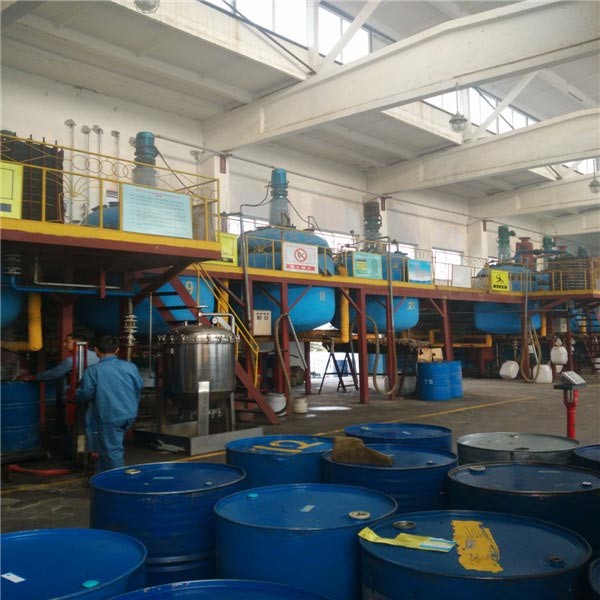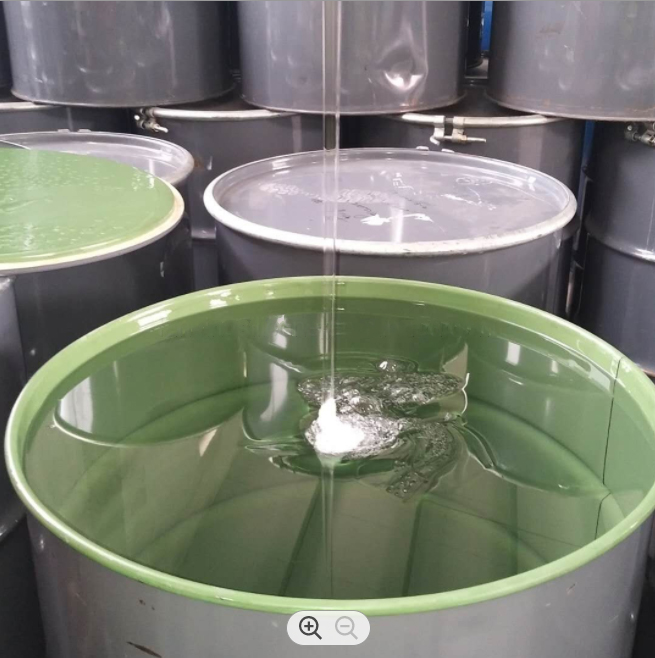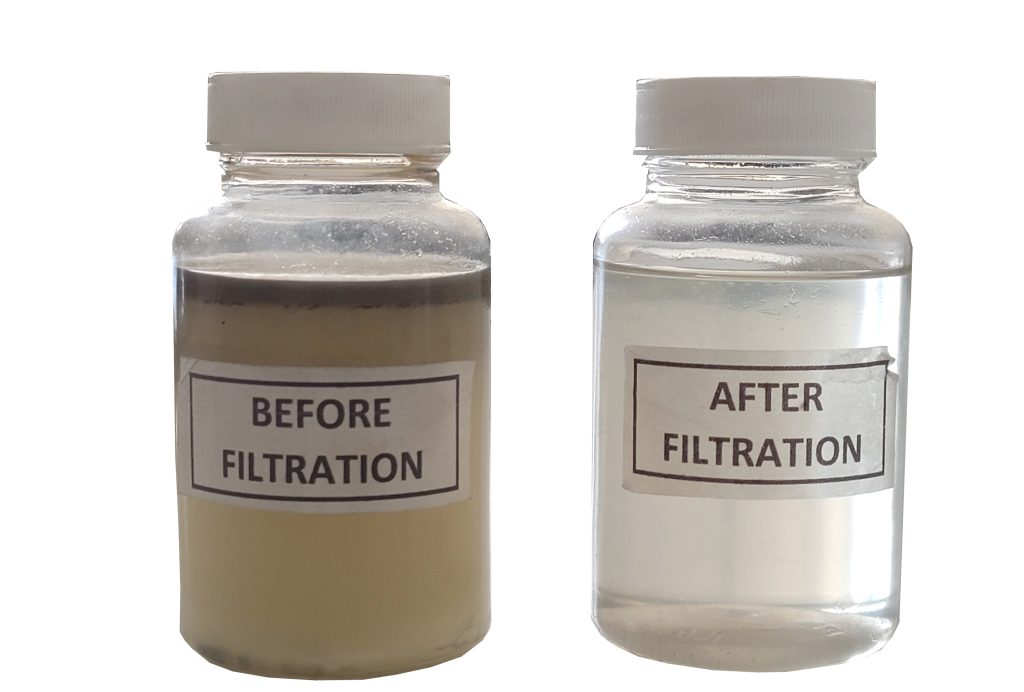Silicon oil filtration is the process of removing impurities from silicon oil, which is a clear, colorless, and odorless liquid commonly used as a lubricant and heat transfer agent. Filtration of silicon oil is important because impurities can cause damage to sensitive equipment and reduce its performance and lifespan
- DEPTH- FILTRATION using filter cartridges: This method involves passing the oil through a filter cartridge, which traps impurities as the oil flows through. The cartridges can be made of various materials, including paper, fiberglass, and nylon, depending on the size and type of impurities being removed
Ultra-Fine Filtration Results on used silicon oil using destiny International Depth Filter Media
The choice of filtration method will depend on the type and amount of impurities present in the oil, as well as the desired level of purification.Silicon oil filtration is a critical process for maintaining the performance and longevity of industrial equipment that uses silicon oil as a lubricant or heat transfer agent. Impurities in the oil can cause damage to the equipment, reduce its efficiency, and result in costly repairs or replacements. Therefore, it is important to understand the common problems associated with silicon oil filtration and the solutions that can be implemented to mitigate these issues.



Particulate matter, such as dust, dirt, and other debris, is one of the main contaminants found in silicon oil. When these particles circulate in the oil, they can cause physical damage to the equipment, including wear and tear on moving parts. The particles can also clog filters, reducing the efficiency of the filtration process.
Best solution to this problem is to implement a regular filtration schedule using cartridge filters. Cartridge filters come in different materials, including paper, fiberglass, and nylon, depending on the size and type of particulate matter being removed. By regularly changing the filters, the oil is effectively cleaned of particulate matter, reducing the risk of physical damage to the equipment.
Water contamination is a common problem in silicon oil filtration. When water is present in the oil, it can cause corrosion and other forms of physical damage to the equipment. Additionally, water can interfere with the efficiency of heat transfer in the oil, reducing its effectiveness as a heat transfer agent.
Silicon oil filtration is a critical process for maintaining the performance and longevity of industrial equipment that uses silicon oil. By understanding the common problems associated with silicon oil filtration and implementing effective solutions, it is possible to effectively purify the oil, reducing the risk of damage to the equipment and improving its performance. Whether using centrifugation, cartridge filtration, membrane filtration, or distillation, it is important to regularly filter the oil to maintain its purity and extend.
General Information: Silicone oil (PDMS) is a colourless, transparent, viscous liquid that can be obtained in a range of viscosities. PDMS can be combined with a thickener, usually fumed silica, to produce silicone grease (a thick white paste), or with fillers, typically boron, to produce silicone putty
PDMS is commonly used in the cosmetic, pharmaceutical and engineering industries, and as lubricants, anti-foaming agents and insulation.
Viscosities of silicone oils at room temperature range from approximately 1 x 104 to 3 x 104 Pas (Weijermars et al., 1986; Corti et al., 2005) and decrease exponentially with decreasing temperature (Arrhenian dependence, Hailemarian and Mulugeta, 1998; Cagnard et al., 2006). This viscosity range may be expanded through mixing with other materials (Galland et al., 2015), and different silicone oils can be blended together to change the viscosity (see Shin-Etsu Silicone technical sheet for method).
Silicone oils are Newtonian fluids at typical laboratory temperatures and strain-rates (Galland et al., 2015) and at low molecular weight up to strain-rates of 1000 s-However at high molecular weight and high strain-rates, PDMS becomes shear thinning i.e. viscosity decreases with strain-rate
Figure 1. Newtonian rheology of silicone oil, from Mall-Gleissle et al. (2002) and shear thinning behaviour at high viscosity and strain-rate,
Surface tension of silicon oil is low, approximately 0.02 N/m (Shin-Etsu Silicone technical sheet), which results in high wettability and spreading characteristics (Khan et al., 2009) and densities on the order of 0.8 x 103 to 1 x 103 kg m-3 (de Bremond d’Ars et al., 2001; Watanabe et al., 2002; Kervyn et al., 2010; Spina et al., 2016).
The material is viscoelastic i.e. it has a component of time-dependent strain, for example, experiments by Kokuti et al. (2011) on a silicone fluid show a viscosity variation from 400 Pas to 50 Pas with increasing frequency. Silicone oil is also incompressible.
Silicone oils are transparent and therefore very useful for experiments that require imaging of processes. Furthermore, there is a good contrast in x-ray attenuation between PDMS and less absorbent materials such as quartz (Colleta et al., 1991), making it ideal for CT analysis (e.g. Kervyn et al., 2010).
Water contamination is a common problem in silicon oil filtration. When water is present in the oil, it can cause corrosion and other forms of physical damage to the equipment. Additionally, water can interfere with the efficiency of heat transfer in the oil, reducing its effectiveness as a heat transfer agent.
Silicone oil is a widely used analogue material due to its versatility and consistency i.e. physical properties do not vary significantly between different batches. It also displays minimal degradation over a wide temperature range (-40 to 280 °C).
Due to being insoluble in water, silicone oil can be difficult to clean. Vegetable oil and washing up liquid should be used to clean up any leftover material.
There are no major safety issues in using silicones. They are non-toxic and non-flammable. Care needs to be taken, however, with spillages.
Users may prefer to wear protective clothing to protect own clothes.
Don’t change your oil, filter it!
Can’t find what you’re looking for?
Contact Us for overarching Solutions
Destiny standout as the most reliable supplier & Manufacturer exporter of Silicon Oil Filtration, Hydraulic oil filtration machine, Hydraulic/Lube portable oil filter machine, oil filtration machine in India, Hydraulic Oil Filtration Machine Manufacturer In India
Our dedicated team is ready to assist you with any inquiries, technical support, or scheduling consultations. For all of our services, we bring a Particle Counter and Portable Fluid Analysis Kit onsite to analyze oil samples and document our performance achievement of specified ISO cleanliness levels and moisture content
